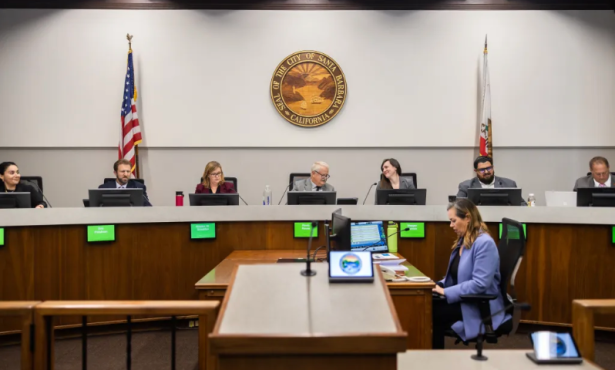Swimming Laps for Life
Head of SurfAid International Joins Swim 4 Humanity Event in Santa Barbara
More than a decade ago, while on a surf adventure in the Indian Ocean, Dr. Dave Jenkins had a startling epiphany in a graveyard. Shuttled ashore to a small island in the wave-rich Mentawai region of Indonesia, Jenkins — who was on one of those fully catered, luxury boat barrel-hunting missions that are all the rage in the area — went out on a sightseeing tour when he made a discovery that would change his life and, in turn, change the lives of the people who call the outer reaches of Indonesia home. “When I got on land, I saw a lot of really small graves in the graveyards … We came face to face with those things you see on CNN and I couldn’t walk away,” recalled the Australian physician earlier this week.
After spending a bit more time on the island and learning from the chief of the local community that he was the first doctor to ever actually visit, Jenkins made a return trip the next day with his medical bag in hand. “What really struck me was that a lot of these diseases — especially the ones killing the kiddies — are preventable,” said Jenkins. And so, armed with the new insight and unable to shake the images of so many young children’s graves in a place that is otherwise a proverbial paradise for surfers the world over, Jenkins founded SurfAid International a few months later, dedicating it specifically to improving the health, well-being, and self-reliance of the folks who live in the far flung places we surf while on holiday.
In the decade since, SurfAid has grown into the absolute biggest humanitarian effort in the surf world. Starting first with the mosquito-bite-caused horrors of malaria, SurfAid has provided more than 60,000 mosquito nets spread out amongst 300-plus villages in the Nias and Mentawai Island chains. Even better, according to Jenkins, the villages that SurfAid has established a relationship with through its program have seen a 75 percent reduction in malaria infection rates. From malaria, fate forced an evolution as an aid organization as devastating earthquakes and tsunamis struck the region. Already deeply connected with some of the hardest hit areas, SurfAid responded by running several emergency response operations, effectively delivering supplies and medical services at a time when most other agencies couldn’t get in. “Back when we first started, I never envisioned SurfAid as such,” opined Jenkins, before adding, “We’ve learned a lot but there is so much more that needs to be done.”
To that end, SurfAid is embarking on a new chapter in its aid efforts, turning members’ attention to what Jenkins calls “the major underlying issues.” Faced again and again over the years with the hygiene and nutritional woes plaguing many of these communities, especially during childbirth, Jenkins has turned his attention to relatively simple fixes with potentially life-saving results. Through educational drama games, songs, and the wonders of digital photography and filming, Jenkins and his team are trying to instill in the native people a more First World concept of health. “We are talking about getting people to wash their hands before childbirth, to not use bamboo to cut the umbilical cord, the importance of colostrum and basic nutrition,” summed up Jenkins. “It might seem easy to us but it is hard to get people to change what they have been doing for thousands of years … There is a real dire need for this stuff.”
To that end, Dr. Jenkins and world-record holding swimmer Jessica Hardy will be on hand this Saturday at Los Banos Pool in Santa Barbara for the 2010 Swim 4 Humanity event. The fundraiser, which runs from 2 to 6 p.m., will feature teams of participants swimming as many laps as they can in 30-minute increments. For more information, go here



